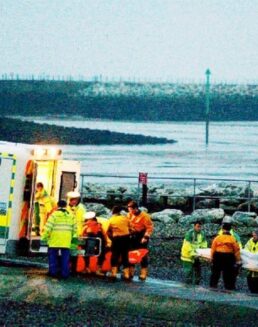Slavery was abolished in the 19th century. That is a fact that every student since has been told.
But, has it really disappeared completely?
In the 21st century, we don’t expect to hear the word ‘slavery’ often; the appalling conditions and treatment of enslaved Africans in the Transatlantic Slave Trade are still remembered- an important part of human history. In the modern world, the shackles and chains, the branding of owners’ names on arms, and the horrible punishments for the enslaved are long gone, and is instead replaced by something less visible, but equally deadly- something called ‘modern slavery’.
On the evening of 5th February 2004, twenty-three Chinese cockle pickers drowned after being trapped by the rising tide off the Lancashire coast of Morecambe Bay. The victims included two women and twenty-one men, who were believed to be searching for “a better life”, wishing to send money to their families by taking on the job of cockle-picking. They were underpaid, working in dangerous conditions without any safety equipments, for only £10 a day. The investigation after the tragic incident revealed that they were victims of exploitation by a man named Lin Liang Ren, who deceived and forced them to work while only he himself benefited from the profit. He was only imprisoned for four months for manslaughter, and was later deported to China. The lone survivor from the tragedy, Li Hua, still suffers from mental traumas long after the incident. “I think a lot about those who didn’t survive, particularly at Chinese New Year, because it happened around that time,” he said.
In the recent weeks of January 2023, dozens of asylum-seeking children had been kidnapped by gangs from the Hythe Hotel in Brighton in a pattern repeated across the south coast. Children were abducted from the hotel and bundled into cars, disappearing and not found. A whistleblower working near the hotel claimed that 10% of asylum-seeking children, who were without parents or carers, goes missing from the hotel each week. The hotel is run by the Home Office, which should be protecting the people who stayed in the hotel. It is believed that the children could be taken by traffickers as far as Manchester and north of Scotland. The cases have been escalating since April, 40 teenagers have been reported missing in August 2022 alone. 600 passed through the hotel in the past 18 months, and 136 were reported missing. It is predicted that traffickers used the Home Office’s policy of sending asylum-seekers to Africa as a recruiting tool. “Traffickers tell them they’ll be sent to Rwanda if they stay in the hotel.”
Whether it’s the cockle pickers who dreamed of a better future, or the asylum-seeking children who were unknowingly kidnapped, they have all become victims of modern slavery. We all want to live a better life, and these people were desperate. But in the end they were tricked or threatened, forced to work in terrible conditions and getting little in return. They were trapped by their employers, unable to escape or ask for help. In other words, they became enslaved.
Modern slavery can take on many forms, including human trafficking, forced labour, domestic servitude and slavery. It is defined as the recruitment, movement, harbouring or receiving of children, women or men through the use of force, abuse of vulnerability, deception or other means for the purpose of exploitation.

People could be trafficked into criminal activities such as cannabis farming and sexual exploitation, and could be forced to work on farms, in construction, shops, bars, nail bars, car washes or manufacturing. Victims of modern slavery might be faced with violence or threats, forced into inescapable debts, or have their passports taken away and threatened with deportation. Many people have fallen into this trap searching for a way out of poverty or insecurity, wanting to improve their lives and support their families. Now, they can’t leave.
Many of us are born with the advantage of having happiness and contentment within our reach, but many more are not. They are vulnerable, and an easy target for the executors of modern slavery. They were threatened and had no choice. 49.6 million people worldwide today live in modern slavery, out of which a quarter are children. However, they can be helped by you. Firstly, you need the recognise the signs that people could be kept in servitude:
- Evidence of a workplace being used for accommodation
- Workers are distrustful of authorities
- Workers look uneasy, unkempt or malnourished
- Signs of psychological trauma
- Untreated injuries
- Evidence of control over movement (being picked up and dropped off in groups)
- Signs of substance misuse
- Workers don’t know work or home address

If you suspect there are victims of modern slavery near you, report it to the Modern Slavery Helpline on 08000 121 700 or the police on 101. In an emergency always call 999. There is always a chance that you can help someone come out of their terrible enslavement.
The punishment for modern slavery is to be subject to imprisonment from a total of twelve months to ten years and/or unlimited fine. However, where false imprisonment and kidnapping is involved, it is life imprisonment. In the UK, Theresa May brought forward the Modern Slavery Act in 2015, which aimed to minimise the possibility of modern slavery, by identifying modern slavery in operations and supply chains.
“From nail bars and car washes to sheds and rundown caravans, people are enduring experiences that are simply horrifying in their inhumanity.”
Although the whips and screams from the olden slave trade has already slowly faded into history, the present deafening silence of modern slavery is still as dangerous as before. Perhaps, the exploitations between the human race is never meant to have an end. But again, if those who are aware of the issue strive to alleviate it, less innocent people will have to go through the horrific experience of being enslaved.
By Lily Ma